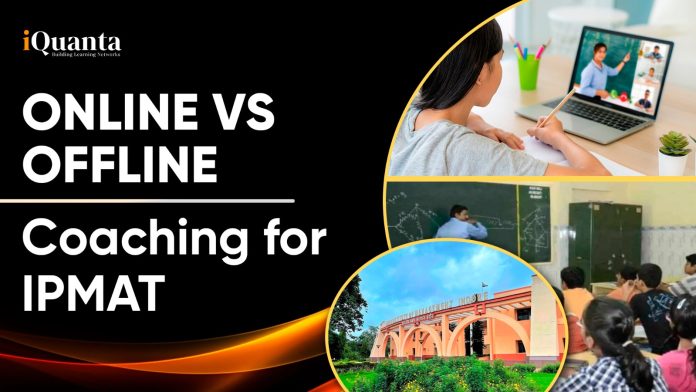In recent years, the Integrated Programme in Management Aptitude Test (IPMAT) has gained significant attention among students aiming to pursue a career in management. Conducted by the Indian Institutes of Management (IIMs), this entrance examination provides a unique opportunity to secure a seat in a 5-year integrated management program directly after Class 12.

As competition intensifies, aspirants often begin their preparation as early as Class 11 leaving students and parents faced with a fundamental decision: Should IPMAT preparation be pursued online or through traditional offline coaching?
With advancements in digital education and the emergence of structured online platforms such as iQuanta, this question demands a closer, evidence-based look. In this article, we have listed the differences between online and offline IPMAT coaching and outlined why online models are becoming increasingly preferred by students across the country.
What Is IPMAT?
The Integrated Programme in Management Aptitude Test (IPMAT) is a national-level entrance exam conducted by select Indian Institutes of Management (IIMs) like IIM Indore and IIM Rohtak. The IPM program offers a structured curriculum that combines disciplines such as mathematics, economics, and social sciences in the initial years, followed by a full MBA in the latter phase.
With only a few hundred seats available across all participating institutes and a rapidly growing applicant base, IPMAT is highly competitive and one of the most sought-after 12th exams in India
Key Details:
- Eligibility: Students must have passed Class 12 (or equivalent) or be appearing for it in the admission year
- Top Participating Institutes:
- IIM Indore (IPMAT Indore)
- IIM Rohtak (IPMAT Rohtak)
- IIM Ranchi (IPMAT Indore)
- IIM Amritsar (IPMAT Indore)
- IIM Shillong (IPMAT Indore)
- IIM Jammu (JIPMAT)
- IIM Bodhgaya (JIPMAT)
- Exam Structure:
- Quantitative Ability (QA)
- Verbal Ability (VA)
- Logical Reasoning (specific to IIM Rohtak)
- Format: A combination of multiple-choice and short-answer questions under timed sections
Offline Coaching for IPMAT Advantages & Disadvantages
1. Fixed Routine and Environment
Offline coaching provides a consistent daily routine that instills discipline and time management skills in students. The physical classroom environment minimizes distractions from home and social media, creating a focused learning atmosphere. Scheduled classes with attendance expectations also help students stay accountable throughout their preparation journey
2. Immediate Face-to-Face Interaction
Students benefit from direct, in-person communication with faculty. This can make it easier to ask follow-up questions, receive personalized attention, and clarify complex concepts on the spot. The dynamic of physical presence often leads to better engagement and retention of concepts
3. Peer Learning and Motivation
Classroom-based learning encourages peer interaction, group study, and healthy competition. Being surrounded by like-minded aspirants often fosters a sense of community and shared purpose, which can help maintain motivation and overcome academic plateaus
4. Limited Flexibility: Students must adhere to a fixed schedule, which may not align with their productivity hours or school timings. Missing a class can mean missing critical concepts with limited opportunities for revision
5. Location Constraints: High-quality offline coaching centers are often concentrated in major cities, making them inaccessible for students in rural or Tier-2 regions. Relocating brings additional logistical challenges
6. Higher Cost Structure: Tuition fees, travel, accommodation, and food expenses significantly increase the overall cost of preparation, especially for students who must move away from home
7. Disruption-Prone: Offline models are more susceptible to disruptions due to health issues, weather, or holidays, often resulting in missed classes and rescheduling challenges
Online Coaching for IPMAT Advantages & Disadvantages
The last few years have seen a rapid transformation in the online education ecosystem. What began as an alternative during the pandemic has now evolved into a robust, reliable, and increasingly preferred method of learning.
1. Flexibility and Convenience
Online platforms empower students to design their own study schedules. Whether it’s revisiting recorded lectures at midnight or attending live classes after school, the flexibility allows students to align preparation with their natural rhythms. This is particularly beneficial for students balancing school exams with IPMAT prep
2. National-Level Access to Expert Faculty
With online learning, students are not restricted to local faculty. They gain access to highly experienced educators, often IIM alumni, who bring firsthand knowledge of the IPMAT format and expectations. This nationwide access improves the quality of mentorship
3. Affordability
Online coaching removes the need for travel and lodging, reducing overhead costs. Many platforms, including iQuanta, offer competitive pricing, installment plans, and bundled content packages that make quality education more accessible
4. Round-the-Clock Doubt Resolution
One of the standout features of iQuanta is its 24×7 doubt-solving groups, where mentors and fellow aspirants offer continuous support. This ensures no query is left unresolved for long, promoting uninterrupted learning
5. Data-Driven Progress Tracking
Modern platforms provide real-time analytics on mock tests, topic-wise performance, and improvement trends. This enables students to identify weak areas, adjust strategies, and optimize their preparation
6. Accessible Anytime, Anywhere
Students from remote areas or with mobility challenges can prepare for IPMAT without relocating or compromising on quality. All that’s needed is an internet connection and a device, eliminating barriers to access
7. Self-Discipline Required: The flexibility of online learning demands strong time management and self-motivation. Without a fixed routine, some students may procrastinate or lose momentum
8. Screen Fatigue: Long hours in front of screens can lead to reduced concentration and physical discomfort if not managed properly with breaks and ergonomics
Key Features of iQuanta’s IPMAT Program
Among online coaching providers, iQuanta has gained prominence for its specialized approach toward management entrance exams, including IPMAT. iQuanta’s strength lies in its community-driven learning. It combines structured learning with real-time support, creating an experience that is both comprehensive and student-centric like:
- Live interactive sessions that allow students to ask questions in real time
- 24×7 doubt-clearing groups, where mentors and peers provide instant academic support
- Mock tests modeled on actual IPMAT papers, with detailed performance analysis
- Access to IIM alumni mentors, who provide strategic insights and interview guidance
- Recorded classes, allowing students to catch up or revise at their convenience
Online vs Offline Coaching Comparison
| Feature | Online Coaching (e.g., iQuanta) | Offline Coaching |
| Flexibility | High – study anytime, anywhere | Low – fixed schedule and location |
| Doubt Resolution | 24×7 support, community-driven | Limited to classroom hours |
| Faculty Access | National-level experts, IIM alumni | Limited to local faculty |
| Learning Pace | Self-paced with revision options | Fixed pace, harder to revisit lessons |
| Cost Effectiveness | Affordable | Generally more expensive |
| Location Dependence | Accessible from anywhere | Limited to metro or urban areas |
| Personalization | Adaptive testing, progress tracking | Manual feedback, less data-driven |
There is no one-size-fits-all solution when it comes to exam preparation. However, in today’s educational landscape, online coaching provides unmatched flexibility, accessibility, and support, especially for students outside urban cities. For aspirants targeting IPMAT 2026 or 2027, starting early with a reliable platform like iQuanta can provide the strategic edge needed to excel in this competitive exam.


